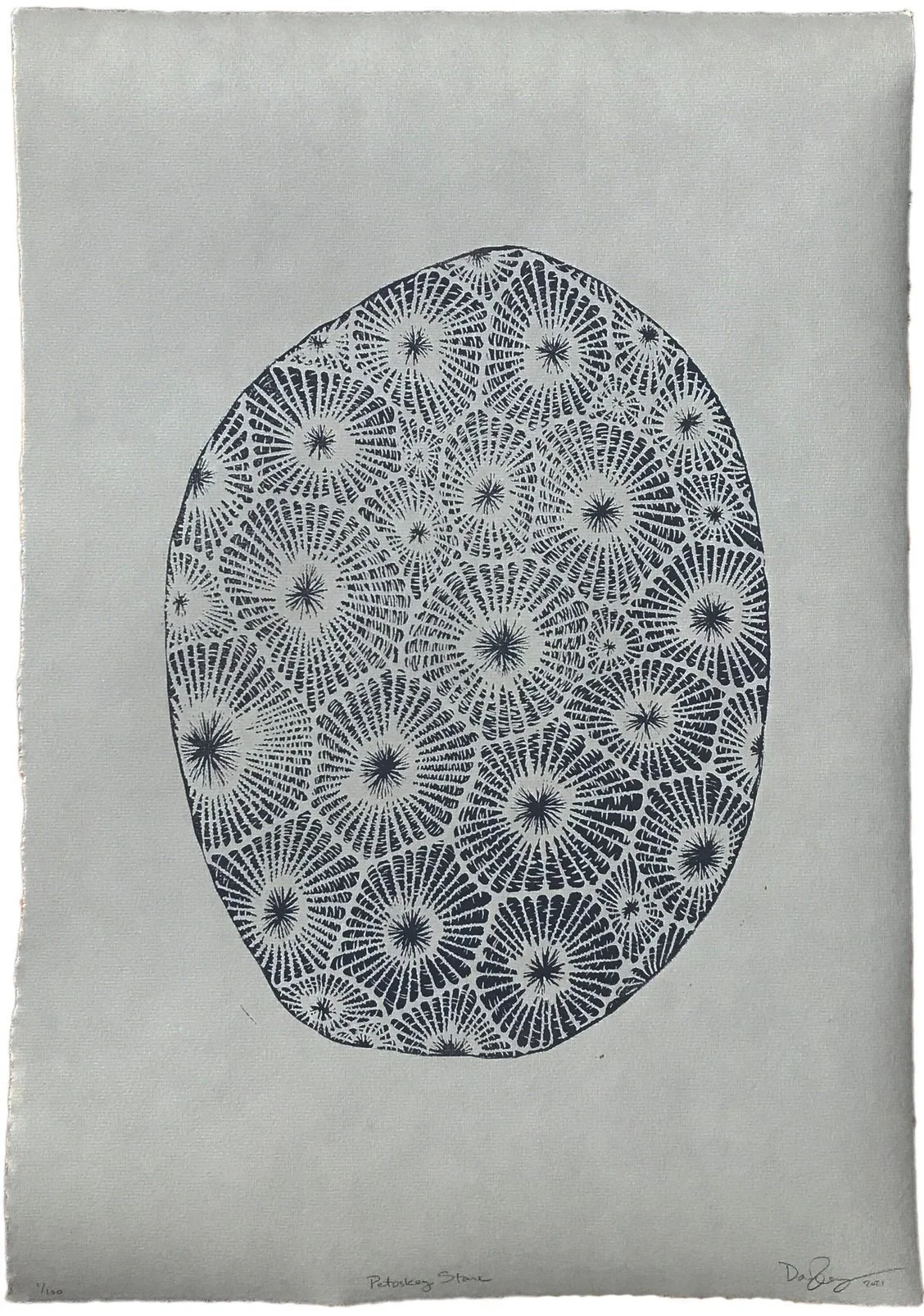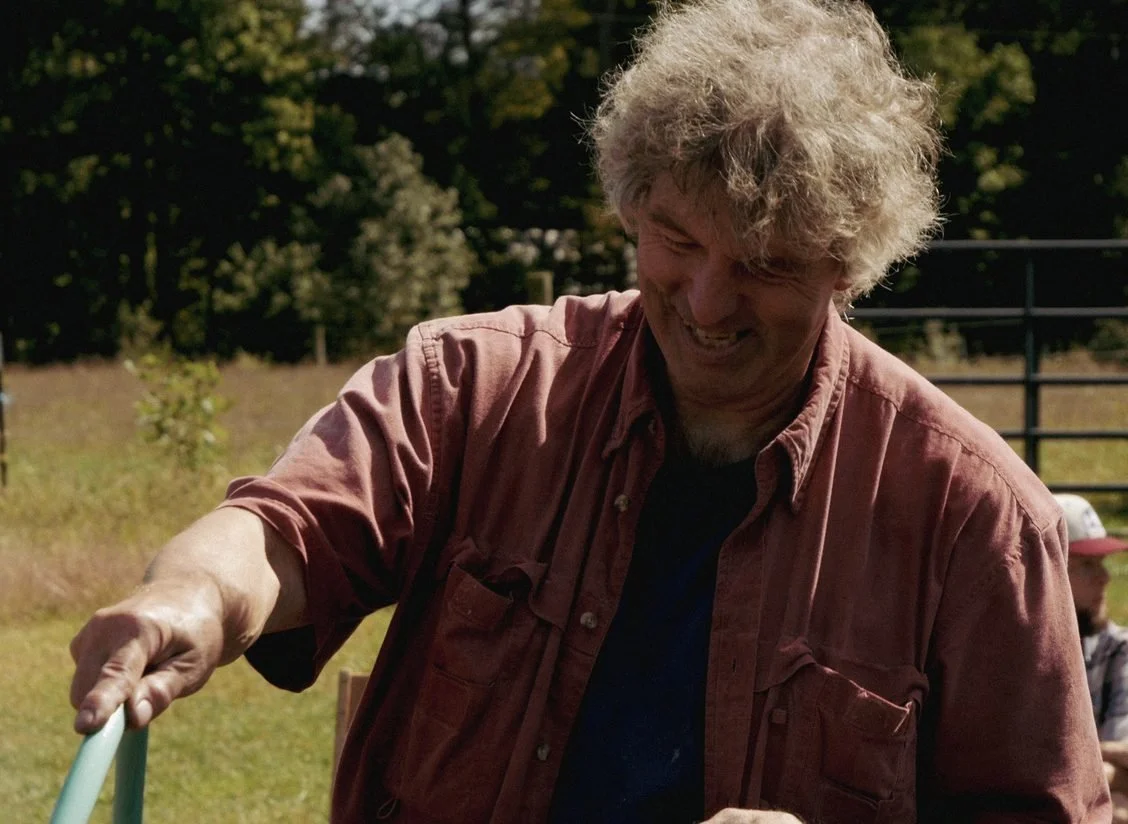The Whole Field • Volume 01 • Issue 01 • Super Blood Moon • May 16th, 2022
Petoskey Stone • Linocut Print • Edition of 100 • Dana Falconberry
In this inaugural volume we briefly consider the role of technology in our lives and work; first with a report of a rancher with a make-do philosophy, and then with some consideration of the techno-utopia—can we engineer our way to a better future?
The Best Tool for Soil Health? An Empty Bank Account.
by Taylor Reed || 1,418 words (6 minute read)
Driving to May Farm, I thought I knew what to expect: a farmstead, brick walls, hand-hewn timber, smoke wafting from a chimney in the evening glow, and the cacophony of creaturely sounds I had grown to associate with smallholdings. When I arrived, I pulled into a gravelly drive on thirty acres of leased land. I didn’t see what I had mistakenly envisioned. I saw grassland and a figure, bent at the waist, finishing his evening chores. Stillness and light wind through the trees surrounding much of the acreage–that’s what I heard. Paul, no longer hunched, slowly walked towards me, pointed me around a bit and told me where I could film. He didn’t have to say much. He rents this acreage for his cows, while his home and the rest of his farm are elsewhere. As far as I could see, the content of the video I was there to capture the next day would have to be driven by Paul May’s philosophy of land, grazing and proper scale, rather than visual stimuli.
Paul May—systems thinker and wielder of 5-gallon buckets
Paul, one of three graziers in Northwest lower Michigan’s Benzie County, raises cattle on pasture and advocates for a holistic approach to soil health and local economies. On the day of our rotational grazing workshop, some of Paul’s first words to the camera articulated this approach: “I don’t think that anything is separated from anything else.” He returned to this time after time throughout the day. “That is institutional thinking!”, he would exclaim as he pushed those in attendance to reframe their thoughts in terms of systems rather than compartmentalization. Inquiries most often received responses akin to “if you want” or “it depends”. He continuously drove the point home that the seemingly finer points of pasturing are linked together and must be considered together. Myopic focus leads to dislocation...
The Warp — Ideas and Inspiration
|| 1 || A handful of the New Alchemy Journals are now online for free. These are an incredible resource for all sorts of experimental eco-technology from the 1970’s through the 1990’s, as well as lots of social and cultural thinking about what it means to make a transition to a fossil-free existence.
|| 2 || DIY/DIT! Here’s a short video tour of a homemade walk-in fridge, commonly built by farmers and are one of the key tools for helping farmers prep for market. These rely on a Coolbot, a device that overclocks a window A/C unit to produce cooler temps (though not always).
Related, a thought on making air conditioners 33% more effective. Despite some early trolling, the comments section does a good job getting into the technical weeds about what’s really at play with A/C efficiency.
(Oh, and farm coolers are a common project that our microloan will fund.)
|| 3 || Where is My Flying Car?, the futurist techno-utopian classic, has been released in a new edition. “From the failure to adopt nuclear energy and the suppression of cold fusion and nanotechnology to the rise of a counterculture hostile to progress, Hall recounts how our collective ambitions for the future were derailed, with devastating consequences for global wealth creation and distribution.”
Woah. “Counterculture hostile to progress” is a loaded term if I’ve ever seen one. If you want to unpack that, a helpful counter-narrative comes in the form of Plan C: Community Survival Strategies for Peak Oil and Climate Change. Related: see how these predictions of the techno-utopian future (of 2020) from Wired turned out (spoiler: not great).
|| 4 || Speaking of the techno-utopia and its discontents, see L.M. Sacasas' The Human-Built World is Not Built for Humans.
“Then along comes someone like Illich or Ellul claiming that maybe the whole modern techno-social order, whatever its relative merits, is broken and malignant. That the roots of our problems run much deeper than we had assumed. That we are, in truth, doing it all wrong and should revisit some of our most fundamental assumptions. You may not, in the end, agree with their conclusions, but seriously considering their perspectives should at least help us to ask better, more fundamental questions about the human-built world, or, perhaps more importantly, about the beliefs, values, and interests that shape it.“
The Weft — News and Events
|| 1 || The Build and Broaden Indigenous Agriculture and Food Sovereignty Symposium is taking place May 20th-22nd at multiple venues across Marquette, MI and the Keweenaw Bay Indian Community. If you’re interested in topics like decentralized food systems, indigenous farming and foraging practices or Native American land stewardship, this will be a great one to attend. I hope to see you there!
|| 2 || Edible Trails Work Bee- In February, we lost a beautiful friend. Jonathan Aylward was a dreamer and a connector, always generous with his ideas, time, and company. He had an open way about him that invited easy closeness, and a quick sense of humor matched only by his deep sense of wonder at the world we share.
As a way of honoring Jonathan’s memory and carrying his vision forward, Edible Trails Project (co-founded by Jonathan), will be hosting two events this summer at the DeYoung Natural Area on Cherry Bend Road. The first will be held on Sunday, May 22nd, 2-5pm. Find more information here.
|| 3 || Save the Date. The Traverse City Dance Project will be returning with their outdoor moving theater to again perform at the Crosshatch property meadow in Bellaire on Wednesday, August 3rd, with a rain date of Friday, August 5th. Keep an eye out for more details!





